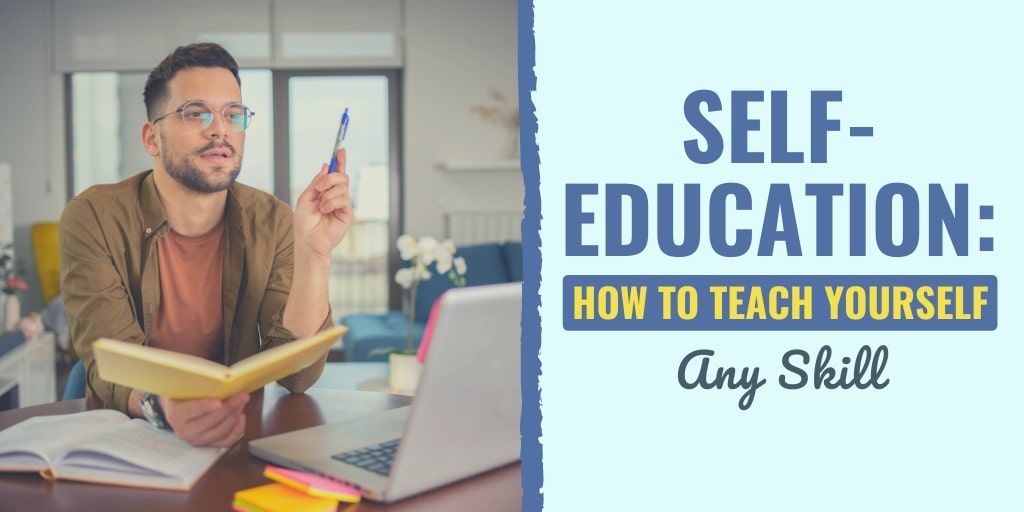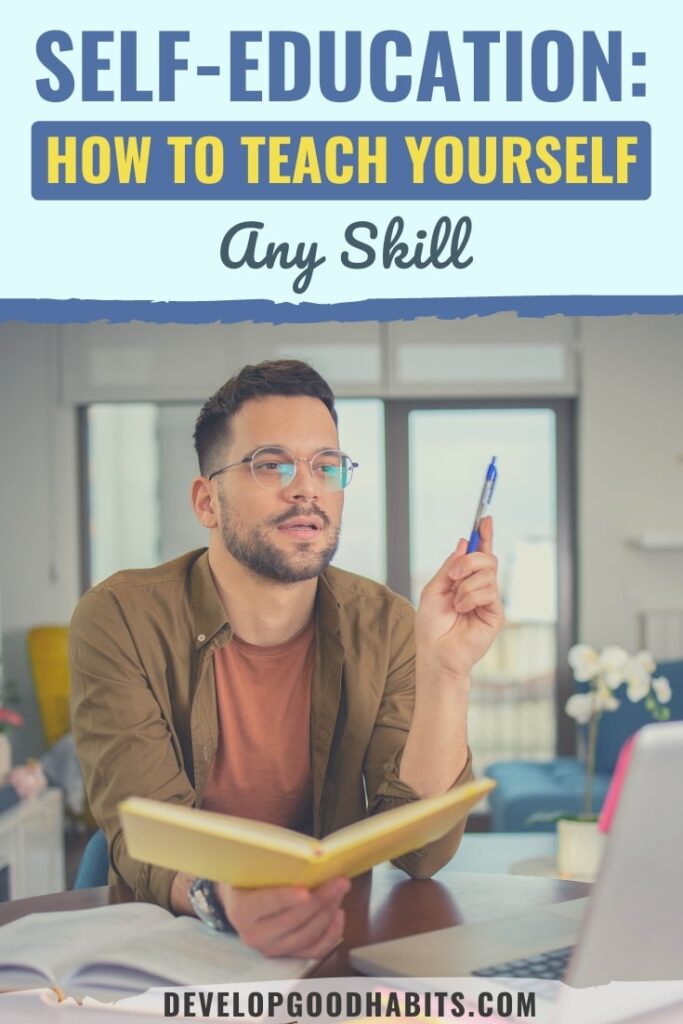There might be affiliate links on this page, which means we get a small commission of anything you buy. As an Amazon Associate we earn from qualifying purchases. Please do your own research before making any online purchase.
Nobody has a perfect life, and anyone who implies that they do is usually attempting to deceive or belittle you to make themselves feel better.
Embracing our imperfections is important, especially if you want to be constantly improving as a person.
This is why self-education is so important.
- Self-education is embracing learning as a lifelong project.
- Creating a “youniversity” is seeing how you can shape your life to support the development and mastery of your chosen business model.
- It is important to identify opportunities for development and understand what actions you can take to further your goals.
Self-Education – The Fastest Way to Success
“A mind needs books like a sword needs a whetstone, if it is to keep its edge. That is why I read so much.” – Tyrion Lannister
Self-education, self-improvement, self-cultivation, and self-discovery are all important steps to taking control of your life.
They are also an easy way to gain an immense advantage over your competition.
According to the PEW research center, approximately 23 percent of Americans do not even read one book per year.
This lack of reading is not just present in people who lack education. YouGov states that only 31 percent of college-educated people read between 1 to 5 books in 2023.
- If you read just one book a month, you are amongst the most read people in the country.
- Even the majority of people who have degrees don’t stay updated in their fields.
- If you’re a solopreneur, having a regular reading habit provides a huge advantage.
Self-Education vs Learned Helplessness
One good way to see the benefits of self-education is to look at its negative opposite.
Learned helplessness is a belief that you are not capable of doing anything to improve a situation or solve a problem.
It was formally recognized by psychologists Martin Seligman and Steven Maier in 1967.
An easy way to explain it is to look at how elephants are trained:
- A young elephant is tied to a pole that it can’t escape from, no matter how hard it tries.
- Due to this conditioning, the elephant believes it cannot break free from the pole, so all it takes is a single metal pole to restrain it.
- An adult elephant can weigh 6,000 to 13,000 pounds, depending on the subspecies.
- Even the weakest adult elephant could rip this pole out of the ground without breaking a sweat.
- Animals are prisoners of their conditioning, and these elephants will always carry this learned helplessness with them (although many go on to live wonderful lives in elephant sanctuaries).
Humans can also experience learned helplessness, just like elephants. Fortunately, the learning capability of the human mind means it is significantly easier to free yourself from this limitation.
Learned Helplessness in Humans
Learned helplessness can be experienced by humans in a number of different ways:
- Health – Somebody with a bad habit of eating junk food and drinking too many sugary soft drinks may develop diabetes or high blood pressure and explain it away as “just getting older,” then gradually experience more and more severe symptoms while having an increasingly reduced quality of life.
- Relationships – An abusive partner might convince the other person in the relationship that they are worthless without them. They cut them off from their friends and family, and damage their confidence until the person is a hollow shell of their former self.
- Work – Someone might keep getting passed over for a promotion or stick with a dead-end job that is going nowhere because they believe that they are trapped and unable to learn the necessary skills that can help them advance.
What is the answer to all of these problems?
Educating yourself. Knowledge is the key to nearly all of these issues. It empowers you to more easily overcome the situation you are in.
The video below provides an overview of learned helplessness and the six-step process to banish this unhelpful mentality from your psychology.
The Youniversity Action Plan
Once you know what to do, it’s pretty straightforward to incorporate self-education into your life. No matter how busy you are, you can find or clear time to invest in your future. There is nothing that will benefit you more.
First, you have to understand that, no matter what you want to learn, there are resources available to you.
Read on for some easy-to-apply steps.
Choose Only One Thing at a Time
A divided mind fights against itself.
If you’re a solopreneur who wants to learn more about drop shipping, stock investments, finance management, or freelancing, pick one of these topics to become educated about.
Learn about this subject until you either:
- Feel like you’ve learned as much as you want to know through whatever methods you like.
- Have read 3 books on a subject.
If you read three books on one subject, you are more informed than 99 percent of the population.
It can’t be overstated how important it is to narrow your focus. Approach learning the same way an athlete approaches training.
Many devote nearly all their training time to the development of a handful of exercises, or even just a single movement.
Your brain and nervous system can only adapt to so much, and overloading your mind by trying to learn about five different topics at once may delay your progress.
This is especially true if you are studying in college or have a demanding job.

Turn Self-Education into a Habit
For your self-education to work, it has to be consistent. You won’t reap the benefits immediately. Instead, they’ll come months down the line.
Take it day by day and build small habits that regularly expose you to the information that you want to learn.
Some options include:
- Practicing self-education on your chosen topic early in the morning.
- Looking for “dead time” throughout the day.
- If you have any free time in the evening, devote 30 minutes to self-education.
- If you commute to work or college by train, read a book or listen to a podcast/audiobook/YouTube video.
- There are plenty of opportunities throughout the day to learn or practice a skill, even if you only have 5 or 10 minutes.
When you decide to learn about something that is important to you, it will have a significant impact on your life. You may find yourself enjoying the time you spend learning and increasing your confidence considerably.
If you're educating yourself about a problem that you want to solve or a goal for the future, you may discover that this big, looming problem or goal is not nearly the challenge you thought it was. That’s the power of knowledge.
Use Just-in-Time Learning
Just-in-time learning means only paying attention to information that can be immediately acted upon.
This is an effective way of learning because it does away with the idea that you need to sit through hours of lessons to learn what you need.
An easy way to apply just-in-time learning is to break down what you need to learn into small steps, and then focus only on learning them.
For example, let's say you want to be healthier and learn how to cook:
- One approach is to just read about random cooking techniques and equipment, and scour the web for random recipes. But this is not necessarily a very efficient way to learn.
- Another approach is to choose one recipe you like and focus on the prep, techniques, and method. Then, once you have mastered it, choose another recipe and do the same thing.
- When you get good at four or five recipes, you might then explore cooking more broadly.
Just-in-time learning can be applied to any subject or skill. It makes it simpler to focus on a starting point and not get overwhelmed by information that may not be that useful to you.
Gather Your Education Resources
Just as any good course has study materials, any good self-educator knows where to find the resources that will help them learn what they want to know.
Thanks to the Internet, there is no shortage of resources available. Here are six of the best ones available to you:
- Buy or borrow top-rated books: Google the books most recommended by experts for a topic (see here for a cooking example). Most, if not all, of these books are available on Amazon, Audible, or at your local library.
- Listen to podcasts: Download Stitcher and look for whatever niche you’re interested in. The app will compile podcasts into a playlist that you can listen to when you have the time.
- Watch video tutorials for skills that require demonstration: You can find videos about almost anything on YouTube. For more specialized instruction, check out sites like Lynda, Udemy, Creative Live, Skillshare, Khan Academy, Coursera, edX, or Masterclass.
- Apply skills in the real world: Look for opportunities to use your skills in real life. This will depend on what you’re learning, of course. Options include going to courses at community colleges, centers, and libraries, as well as hiring a private coach to evaluate your performance.
- Use other online resources: Tons of blogs and other websites are devoted entirely to niche topics. You can join online forums and groups, or even start a podcast if you want to connect with experts.
- Purchase courses: Buying a detailed course outright can be the most costly option, but it often comes with the benefit of being specifically tailored to your chosen subject or skill. This can often be the fastest way to learn something.
These six options provide you with information you need to learn about various topics.
There’s more than enough information online that you can use for free, but, in some cases, it may be worth it to purchase books or courses.
Benefits of Self-Education
There are some very obvious benefits to engaging in this type of learning.
- You grow your knowledge base: The more you read, the more you learn. The more well-rounded you become, the less helpless you feel.
- It supercharges your confidence: Positive self-talk is wonderful, but nothing makes you feel rock steady about yourself better than actively learning about and solving problems in your life. Starting your own online business and succeeding in goals that you set for yourself is incredibly fulfilling.
- It’s really good for your brain: Actively learning about new topics keeps your brain sharp. Your brain functions at peak efficiency when it’s forced to absorb and understand new information and develop neural pathways for new skills.
- It makes life more fulfilling and less boring: When you know there’s always more to learn, there’s no reason to ever be bored.
Final Thoughts on Self-Education
Making your own “Youinversity” and finding ways to develop yourself through self-education is a great way to create the life you want.
There are virtually endless resources available, and the rewards are enormous.
Here’s a recap of everything we’ve discussed today:
- Self-education gives you the confidence to turn any situation around and overcome feelings of learned helplessness.
- To self-educate, do the following:
- Focus on one topic at a time (this is really important!).
- Find ways to make self-education part of your daily routine.
- Employ just-in-time learning (focus on only the important info).
- Take advantage of books, blogs, courses, demonstrations, podcasts, and all the information available online.
Enjoy the massive benefits!
And if you're looking for more articles on learning new skills, be sure to check out these blog posts:




